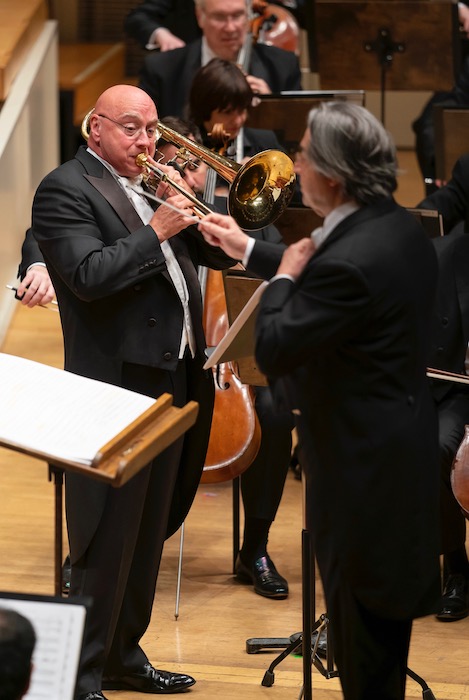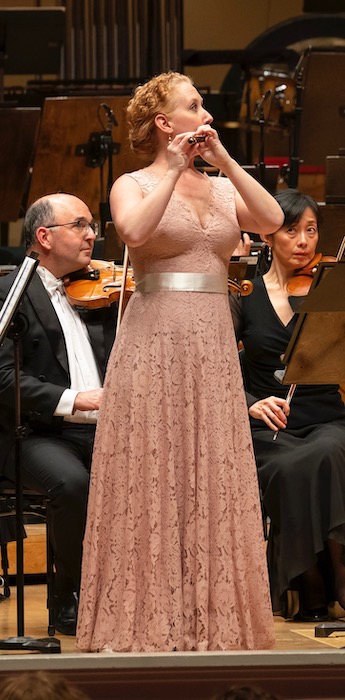Six octaves of separation in Chicago Symphony marathon with vying piccolo, bass trombone concertos

Charles Vernon performed the world premiere of James Stephenson’s Bass Trombone Concerto with Riccardo Muti and the Chicago Symphony Orchestra Thursday night. Photo: Todd Rosenberg
Thursday night’s reshuffled Chicago Symphony Orchestra program may have been something of an overlong hodgepodge. But at least it was a varied and interesting one: five works, three concertos performed by two orchestra members—including a commissioned world premiere— and more new and American music in one night than Riccardo Muti usually conducts all season.
Counting intermission, the concert clocked in at around two hours and twenty minutes, even with visible efforts made to move things along as quickly as possible. That included eliminating concertmaster Robert Chen’s entrance and having composers acknowledged from the front of the house rather than climbing onstage. Muti jovially prodded soloist Charles Vernon with his baton, encouraging him to hasten his exit while Vernon was still taking his curtain calls.
The scheduled Tchaikovsky Suite No. 3 was jettisoned to make room for Jennifer Gunn’s performances of two piccolo concertos, which were slated for March but fell victim to the first week of the musicians’ strike—a nice gesture by Muti so the CSO piccoloist’s preparation and rehearsal for her rare spotlight moment would not be lost.
Yet the world premiere of James Stephenson’s Bass Trombone Concerto with Vernon as soloist was the main order of business, as originally scheduled.
This CSO commission was a genuine dream come true for Stephenson. Raised in Lockport, the composer’s musical interest was sparked by attending a CSO concert at the age of eight; as a teen and young man, he began to obsessively collect CSO recordings, especially those featuring the legendary brass section of the era. Stephenson would go on to become a professional trumpet player, playing for 17 seasons with the Naples (Florida) Philharmonic. Stephenson decided to devote himself full time to composition 12 years ago, and moved back to the Chicago area to pursue his career.
It’s a great story and one would like to report that his commission for CSO bass trombonist Vernon was a triumph.
Sadly, that’s not the case. As shown by Thursday night’s performance, Stephenson’s Bass Trombone Concerto is a huge disappointment—a cacophonous, inept and wildly overscored mess.
Cast in two movements, the concerto is, says Stephenson, a reflection on life at turning 50. The first movement (“Chapter I”) paints “a bass trombone coming of age,” starting in optimism only to encounter, confusion, conflict and agitation before regaining confidence. The second movement (“Chapter II—Epilogue”) encounters “audacious music brimming with pomposity” moving to “heart-wrenching ‘life moments’” before a period of reflection and an ultimate sense of renewal and affirmation.
The concerto begins with pointillist orchestral scoring and sudden brass snarls. The bass trombone soloist soon enters with a bold statement, which immediately turns introspective. The swirling dramatic orchestral waves become a roiling agitated morass, as the solo trombone and ensemble seem to shift into parallel universes. The relentlessly busy orchestra takes the dominant role in the proceedings and the movement concludes with pounding timpani and striding Hollywood theme, sounding like a 1950s biblical film epic.
And so it goes with the second movement continuing in the same noisy fashion–mostly unvaried orchestral clamor sitting on top of the soloist. Amid the bombast and brief respites, the anthemic finale comes off as unearned and gimmicky, like John Williams without the melodic distinction.
Stephenson came late to composing and is largely self-taught, which is, unfortunately, evident throughout this score. Even the most rudimentary harmony and orchestration training—and common sense—would indicate that the symphonic scoring is far too thick and loud for a low brass solo instrument.
The result is that the souped-up orchestral writing had the bizarre effect of pushing the solo protagonist into the deep background. For most of the 23-minute duration, Charlie Vernon seemed like a bit player in his own concerto.
Four players were needed to handle Stephenson’s percussion expeditionary force: vibraphone, triangle, glockenspiel, cymbals, suspended cymbals, marimba, cabasa, chimes, snare drum, tam-tam, shaker, xylophone, claves, wood blocks, crotales, bass drum, tambourine, and Thai gong, as well as a “bucket of water” and “small polished stone.” If there was an unbolted sink available backstage, surely Stephenson would have thrown that in too.
Never mind that much of the subtler effects were as inaudible as the soloist. Even Muti’s usually skillful balancing had no chance.
Vernon played with fluency, deep, noble tone and an easy, graceful virtuosity when he could be heard. Too bad Stephenson didn’t give this stalwart member of the CSO brass section the music and spotlight he deserved.

Jennifer Gunn performed piccolo concertos by Vivaldi and Ken Benshoof Thursday night. Photo: Todd Rosenberg
Unlike Stephenson, Ken Benshoof solved the problem of writing a concerto for a challenging solo instrument. It was not the vacuous flash of the Stephenson concerto but Benshoof’s inward Concerto in Three Movements for Piccolo that proved the program’s surprise discovery and the understated high point (no pun intended) of the long evening.
Jennifer Gunn premiered Benshoof’s 17-minute concerto in San Diego in 2016 and clearly is in synch with the composer’s gentle idiom. The concerto begins quietly in an impressionistic style and Gunn brought a lucid, Debussy-like purity of tone to her opening solo. The first movement (“Improvisational, freely flowing”) is cast in an engaging bucolic style and Gunn and the four winds of the chamber orchestra forces conveyed the understated charm of Benshoof’s music.
Most of the concerto is written in the piccolo’s low register, allowing a fuller, more sustaining tone than the familiar squeaky heights. That paid dividends in the middle movement (“Calm”) where Gunn’s flute-like timbre conveyed a lovely, meditative quality to the long phrases, spiced by sudden jazz-like turns.
In fact, Benshoof’s scoring is done with impressive skill and delicacy throughout. Even with four horns, the soloist is never overwhelmed, and the brass and wind writing are rendered most evocatively and with restraint.
The uptempo closing movement (“On the Move”) provides a motoric finale with an urban, cool jazz feel. Rather than brilliant display the concerto offers more light and charming virtuosity, finally unloading top high notes with grand effect in the final bars. Gunn’s playing was polished and delightful, and she and Muti made the most of Benshoof’s playful “Ta-da” coda. Gunn was warmly applauded for her performance as was the 86-year-old composer.
Gunn also performed Vivaldi’s Piccolo Concerto in C major, RV 444. The ten-minute piece is characteristic in its amiable virtuosity. Gunn displayed some nifty dynamic marking in the first movement and mostly assured technique in the lightning 32nd-note fireworks of the finale. Most impressive was the Largo, where the CSO’s piccoloist plumbed a degree of plaintive expression one didn’t think was possible on her instrument.
Beethoven’s Symphony No. 2 filled the balance of the program gap. Thursday’s performance was a sturdy one in Muti’s familiar Beethoven style—solid enough but feeling like brush-up prep for next season’s complete cycle of Beethoven symphonies marking the composer’s 250th birthday.
Muti’s beefy approach to the slow introduction made no concessions to this being an early Beethoven work, with the conductor bringing his brand of stentorian vigor to the ensuing Allegro. The finale was equally energized though Muti’s brusque approach conveyed little of the Haydnesque humor and charm. As is often the case with Muti’s Beethoven, the slow movement was the highlight—flowing and piquant with lovely, elegant wind playing.
The evening closed with Gershwin’s An American in Paris.
The sassy Gershwin showpiece may have been a populist choice for the music director’s annual token American work of the 20th century. But the results were mixed at best. Acting principal Mark Ridenour lifted a stylish trumpet solo, lingering jazzily behind the beat, and Robert Chen contributed lilting violin work.
But Muti’s take felt far too hectic and rushed, lacking Gershwin’s high-stepping attitude and Yankee swagger. The climactic reprise of the Charleston theme sounded almost apologetic, and the conductor’s streamlined approach missed far too much color and local incident—feeling more like one was cruising down the Champs-Élysées in an air-conditioned taxi with the windows rolled up.
On to Egypt next week with the Aida season finale.
The program will be repeated 8 p.m. Saturday. cso.org; 312-294-3000.
__________
CSO Notes
*The CSO confirmed Thursday that David Cooper, principal of the Dallas Symphony Orchestra, has been hired as the CSO’s new principal horn. The belated announcement was done in the current Orchestra Hall manner—four weeks after CSO musicians leaked the news to websites. One longs for the day when the orchestra returns to handling news of major hires in a more timely and professional manner.
Cooper has played several programs with the orchestra this season including this week’s concerts. He was previously appointed first chair horn with the Berlin Philharmonic in 2016 but returned to his Dallas job last year.
*Bernard Haitink made it official this week that he is retiring this fall. A September concert in Lucerne will be his final podium appearance.
In his role as CSO principal conductor from 2006-10, Haitink played a crucial role in keeping local symphonic standards high between the Barenboim and Muti eras. His brand of egoless objectivity, scrupulous balancing, and respect for the letter of the score will be greatly missed.
One had a feeling that Haitink’s CSO concerts last fall would be the 90-year-old conductor’s final local appearance. One could hardly have wished for a finer Chicago swan song than the youthful and majestic Bruckner Sixth he led last October.